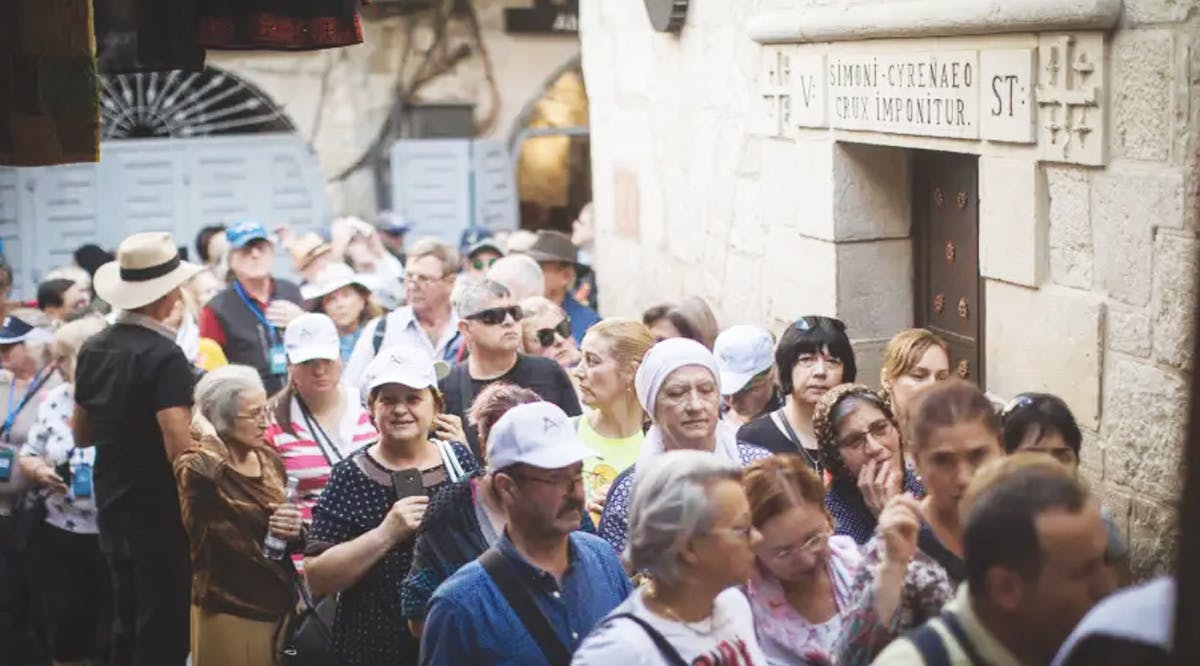
2.5 Mil. Christians Visited Israel in 2019. Will They Return Post-COVID?
Donna Jollay has lost $3 million and thousands of clients since the start of the COVID-19 crisis.
“We are reaching a breaking point,” the owner of Jerusalem Tours International told The Jerusalem Post.
Jollay purchased her company, which specializes in Christian tourism, six months before the start of the pandemic. She said she has at least six groups that she has rescheduled five times since March 2020.
“We are seeing people lose hope,” she said. “They are giving up. You can only be rejected so long by the one you love until you say that it isn’t meant to be.”
Before the COVID-19 crisis, Christian visitors flooded Israel to visit the places they read about in the Bible, connect to their history and experience a glimpse of the future – when most believe Jesus will return and usher in a messianic era that begins in the Holy Land.
But since the pandemic, all tourism – including Christian tourism – has totally dried up.
Prime Minister Naftali Bennett and the Health and Tourism ministries approved a plan on Thursday, October 21, to allow vaccinated and recovered tourists into the country beginning Nov. 1, despite a revelation that at least a handful of cases of the new AY4.2 variant have entered Israel in the last few days. But even as the government approves the plan to open the gates of Ben-Gurion Airport once again to individual travelers, it is unclear whether Christians, who used to account for the largest percentage of annual tourists, will come back the way that tour operators surely hope.
For perspective, before COVID, Israel had reached 4.5 million tourists a year, of which 2.5 million or 55% were Christians, according to data released by the Tourism Ministry at the end of 2019.
The majority (84%) visited Jerusalem, and 65% Tel Aviv, as well as many holy sites throughout Israel, from the Jordan River to the West Bank settlements they call the “biblical heartland” – home to ancient Shiloh, city of the Tabernacle, for example.
In May 2021, when Israel first launched a pilot program to let in small groups of vaccinated tourists, the first to land in the country was a group of 12 Christians led by Tom Zelt from Prince of Peace Church in Fremon, California. The travelers were students at the Concordia Seminary in Missouri, visiting as part of their study program.
But they were few and far between, as Israel’s coronavirus travel rules have kept the vast majority of visitors at bay. The government promised in June, July and again this month to open the country to individual tourists, but no formal announcement had been made until Thursday. And in the release from the Prime Minister’s Office it was already stressed that the plan “would be updated according to developments and the discovery of new variants.”
With evangelical Christians, the situation is even more complex.
Evangelicals are the least likely to be vaccinated of any other Christian group in the United States, according to data reported by Pew Research Center.
Only 57% of white Evangelical Protestants have received at least one dose of the vaccine, Pew reported earlier this month, compared to 82% of Catholic adults, 73% of white non-Evangelicals and 70% of black Protestants.
Christians have often been the people who come to support Israel during its hardest times. They showed up in solidarity during the Second Intifada, and have flown into the country and headed down South to connect with their Israeli brothers and sisters during wars with Hamas.
“They are willing to lay down their selves and their lives to support Israel,” Jollay said. “It is a very hard and sad situation for the Evangelicals to understand: Why isn’t Israel taking them into consideration when they are the largest supporters, when they come when no one else comes?” (JPost / VFI News)
“God, we ask that You protect Israel from Coronavirus, and allow travelers to come and experience the beautiful culture and faith of Your people.”